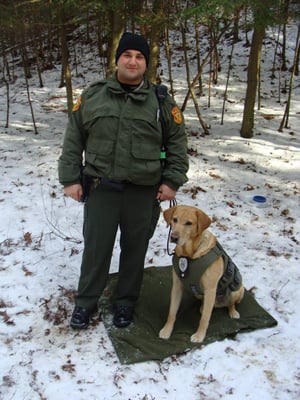Are you interested in wild birds, mammals, reptiles, amphibians, and the places where they live and interact? If this sounds like you then perhaps you should check out Hocking College’s Wildlife Resources Management program. In only four semesters you could earn your Associate of Applied Science Wildlife Resources Management.
What Does it Take to Work in This Field?
A career in the wildlife field requires serious preparation and long hours of hard work to acquire knowledge and skills since there is strong competition for positions. Many of these careers have higher education requirements, so early preparation and determination is important.
What Are Some Careers in Wildlife Resources Management?
Below is a list of the most popular careers in wildlife conservation:
1) Wildlife Manager: Maintains or manipulates wildlife populations, habitats, or human users to produce benefits for wildlife and the general public. Benefits sought may be ecological, economic, social, recreational, or scientific. A wildlife manager uses wildlife science to formulate and apply scientifically sound solutions to wildlife and habitat management problems.
2) Wildlife Biologist: Gathers, analyzes, and interprets data on wildlife and habitats, including behavior, disease, ecology, genetics, nutrition, population dynamics, physiology, land-use changes, and pollution to conserve wildlife species and improve habitat conditions. A wildlife biologist uses scientific principles to research wildlife and habitats to increase our knowledge base.
3) Wildlife Educator: Teaches high school and university students about wildlife science and conservation including wildlife biology, ecology, physiology, disease, toxicology, taxonomy, economics, research and management techniques, and conservation policy and law.
4) Public Educator and Outreach Specialist: Educates the public about wildlife species and conservation issues. Outreach specialists work with private and corporate landowners, industries, citizen groups, and others to provide technical assistance related to wildlife management on private or public farms, forests, parks, urban areas, and industrial lands. Outreach specialists apply economic principles and conservation practices to aid others in maintaining or restoring wildlife on their lands.

5) Wildlife Law Enforcement Officer: Enforces wildlife laws and regulations to maintain wildlife populations at desired levels. Wildlife law enforcement officers often perform surveys of wildlife populations, are involved in trapping and banding programs, implement wildlife population controls, respond to complaints of nuisance wildlife, and educate the public about wildlife issues.
6) Wildlife Technician
Collects data on wildlife and habitats under the supervision of a Wildlife Manager or Wildlife Biologists.
7) Wildlife Inspector and Forensics Specialist: Intercepts smuggled, illegal shipments of live wild animals for the pet trade, and wild animal parts for trophy or medicinal purposes. Wildlife inspectors are stationed at international airports, ocean ports, and border crossings. Forensics specialists perform scientific and investigative work to document the origin and nature of evidence collected on these illegal imports.
8) Communications and Public Relations Specialist: Interprets wildlife research and conservation programs to present to the general public. Communications and public relations specialists write articles and news releases, create brochures, maintain websites, photograph wildlife and conservation activities, and speak at public gatherings or through the media.
9) Wildlife Policy Analyst: Applies wildlife management theories and practices to laws and regulations governing wildlife and habitats. Wildlife policy analysts often work for governments, legislative bodies, nonprofit organizations, or industry groups.
10) Wildlife Consultant: Evaluates ecosystems to determine environmental impacts from proposed actions. Following standards created by the National Environmental Policy Act, consultants provide reports to businesses, industries, and governments to ensure quality environments.
11) Wildlife Economist: Provides economic analyses of natural resources to support policies, critical habitat designation, assess damage, and analyze environmental plans.

12) Wildlife Administrator: Works with many stakeholders and budgets to provide assistance in promoting sound resource management programs designed to effectively manage wildlife and habitats.
13) GIS Specialist: Works with Geographic Information Systems and other technologies to interpret data and make management and policy recommendations concerning wildlife and their habitats.
Where Can I Get More Information About Hocking's Wildlife Resources Management Program?
Anyone interested in more information about Hocking College’s Wildlife Resources Management program can contact the Program Manager, Lynn Holtzman, by email at holtzmanl@hocking.edu or by phone at (740) 753-6274.



